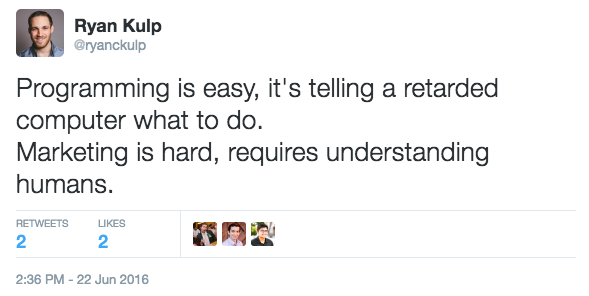A few weeks ago I saw the viral video of Mark Zuckerberg being interviewed in the early 2000’s.
To put it bluntly, he had no vision.
Today, Facebook’s mission is to make the world more open and connected. In 2004, Mark called it a directory for college students.
It’s easy to get discouraged when you see founders like Zuck, Kalanick, Houston, Chesky, etc create world-changing companies.
You might become introspective, asking:
- Could I ever do that? No.
- Am I lucky enough to come up with a great idea? No.
- Will I ever learn to code? Hell no.
And you’re wrong.
First, you’re wrong if you think you’re not capable of great things. I have a learning disability that most people don’t know about or won’t believe if I tell them, and I’m learning more every week at 26 than I ever did in a semester of college.
Second, you’re wrong if you think new ideas matter. Ride sharing, sub-letting, and even collaborative storage are all concepts older than our grandparents. Look it up.
Third, the notion that you should write code to build a technology company is just a clever way to be a quitter. What you do need is expertise about a customer and their pain points; someone else much less talented than you can push buttons on a Macbook.

Today’s success stories do share one thing in common: a great team.
But how great do you really need to be?
Are the companies that perform 100x better than their peers, really 100x better teams? Are the products with better prices, or user experience, or UI, or support, really 100x superior to what their neighbors are building?
The answer is no. (They’re maybe 1.25-2x better, I know because I’ve seen it.)
Since most startups fail, the “startups are hard” narrative makes sense. It’s called Confirmation Bias.
But it doesn’t have to be that way.
See, the right team and the right product and the right market at the right time are all it takes.
And remember, right != perfect.
Because history tells us that if all you do is the right thing at the right time, you can drop out of school, do keg stands at your home office, have zero vision, teach yourself Chinese, and still make billions of dollars.
Startups are easy.
I like how you put it Ryan, Startups are easy and even if one fails, we’re living in a world where the speed of change is greater than the speed one can learn so the very least we could do is fail smart!